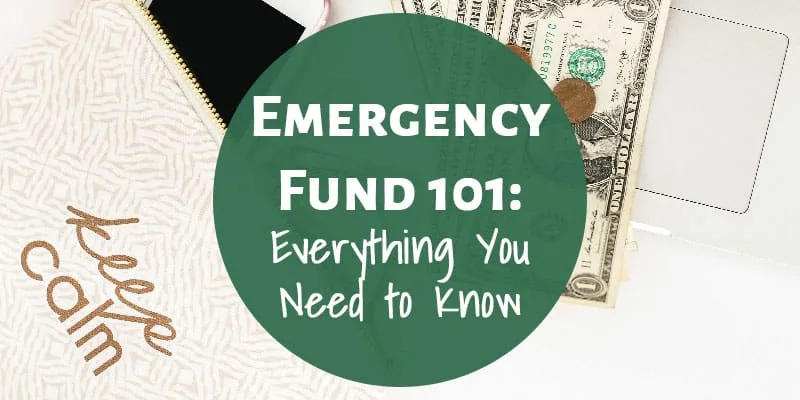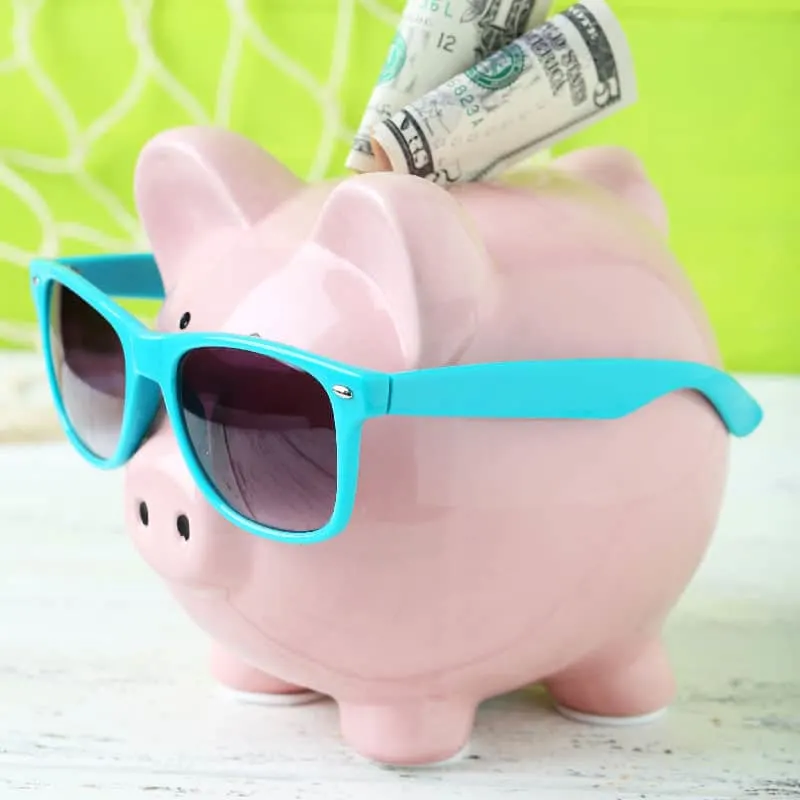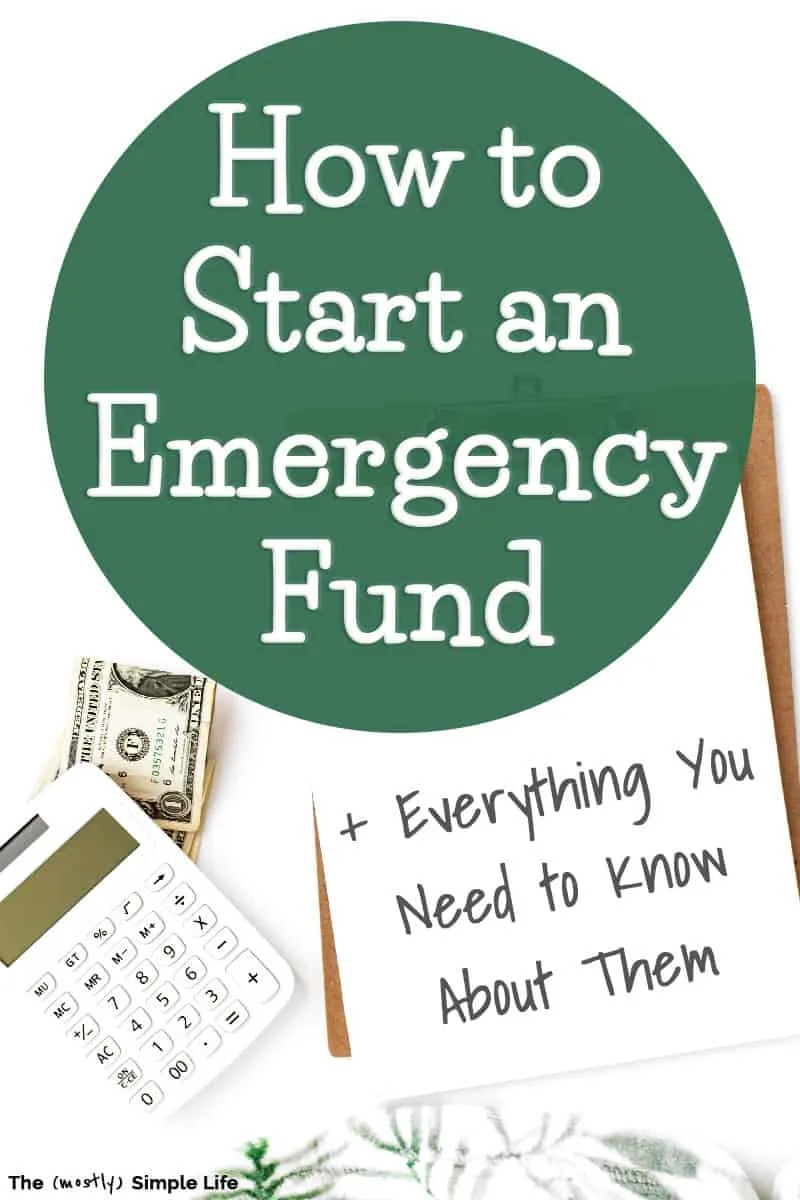
The effects of the Coronavirus have been a big reminder for so many of us of the importance of having an emergency fund. Job losses and medical expenses are just the tip of the iceberg as to why you need an emergency fund. Yes, I’m talking to you!
But maybe you need more details to help you get started. So think of this post as Emergency Fund 101. I’ll answer all of the most pressing emergency fund questions and explain the basics so that you can confidently create your emergency fund.
Creating an emergency fund was a big priority for me early on in our marriage and it has been such a blessing to us over and over again through the years, so I hope you’ll put in the work to save one up for yourself.
Before we dive in… I’ve got free debt payoff and savings goals printables for you! You can use the savings goal thermometer to track your emergency fund progress. Being able to see your progress toward your financial goals will help you succeed. Enter your info below to get started.
[convertkit form=834534]
What is an emergency fund?
It’s simply a chunk of money that you have saved for if when an emergency happens.
Look, we can’t usually predict emergencies, but we do know that they will happen at some point. So an emergency fund is planning for the unknown.
I can tell you from experience that emergencies are a lot less stressful when you don’t have to worry about the money side of things.

How much money should you save in your emergency fund?
Yes, I’ll give you some specific advice, but let me first say that anything is better than nothing. Saving up 3-6 months worth of expenses can feel impossible, but don’t let that stop you from saving anything at all. When an emergency happens, you’ll be thankful for any amount you have.
Most experts say you should aim for 3-6 months worth of expenses saved in your emergency fund — that’s expenses, not income. So if you make $3,000 per month, but your necessary expenses only equal $2,500 per month, your goal would be to save $7,500-$15,000, not $9,000-$18,000. Make sense?
So should you shoot for three month’s worth or six month’s worth? Because there’s a big difference! It really depends on your life situation.
Some factors to consider:
- The general health of you and your family members
- Your job security
- If you earn a fixed salary or have a variable income
- Your comfort level
We try to keep a six month emergency fund because Austin and I each have health problems, my income fluctuates greatly, and I’m a worrier so I’m much more comfortable with a larger emergency fund.
HOWEVER, one more time for the people in the back: Anything is better than nothing.
Where should I put my emergency fund?
The best place to keep your emergency fund is in a savings account that earns a bit of interest. At the time of writing this, many banks offer 1.5-1.7% interest. It’s not much, but it’s a little something.
You want to be able to get to this money quickly if you need it, but you also want to guard yourself against using it for non-emergencies.
If you think you or your spouse will be tempted to spend your emergency fund money when you shouldn’t, you can put it in a savings account at a bank different from where you do your normal banking. It’ll take a little more effort to get at the money this way.
Also, don’t put this money in your usual checking or savings account. And don’t link to your emergency fund account for overdraft protection. These measures will keep it safe.
Should I invest it?
This is a big chunk of money and you may be tempted to invest it to earn more interest than a saving account can give you. Don’t.
Here’s why:
- You want to be able to access this money easily and quickly. You won’t be able to do that with most investments.
- Depending on where and how you invest it, you’ll incur penalties when you take the money out.
- It’s risky. Yes, you could earn more interest, but you also could lose money.
You should have an investment/retirement strategy that is completely separate from your emergency fund. Keep this money safe in a savings account.

What is your emergency fund for? What constitutes an emergency?
Your emergency fund is for true, serious emergencies.
Some examples of when to use your emergency fund:
- Losing your job
- A major medical emergency
- A car accident
- Necessary home repairs (like your heater dying in the middle of winter)
Dave Ramsey recommends that your emergency fund be used on things that are unexpected, necessary, and/or urgent.
Keep in mind that there are plenty of predictable expenses that only happen once in a while. These aren’t emergencies.
Cars break. It’s predictable that it’s going to happen. Ideally, you would use a sinking fund to save up for this kinds fo repairs instead of using your emergency fund.
Learn all about creating sinking funds here.
In the category of definitely not emergencies:
- Vacations and any kind of non-emergency travel.
- Christmas gifts. Christmas is quite predictable. Use a sinking fund to save for it.
- Annual bills like taxes, insurance, etc.
- Really good deals.
How do I save up an emergency fund?
I know that if you just figured out how much three month’s worth of expenses is for you, you’re probably a bit overwhelmed by the prospect of saving up such a huge chunk of money. I’ve been there.
Some things to remember:
- It’s ok if this takes a while. You may save a good chunk of money and then have to use some of it for an emergency and feel like you’re back at square one. Keep plugging along. When I started saving our emergency fund, there were months I was happy if I could add just $20 to it.
- Set mini goals along the way to your ideal number. Your end goal may be $10,000 but right now you’re only worried about saving your first $2,000. That’s great! Baby steps y’all.
- Anything is better than nothing! Yes, that’s the third time I’ve said that and it’s because I mean it. A few hundred dollar squirreled away in a separate savings account is a fabulous start. Do what you can.
So where are you supposed to find all of this extra money? I’ve got ideas!
- Direct deposit. You employer should be able to send a portion of your paycheck directly to your emergency fund account. If that’s not possible, you can set up an automated deposit from your regular bank account to your emergency fund account to happen on payday.
- Your tax return (or covid-19 stimulus money). I know it’s tempting to spend it, but the peace of mind you’ll gain from being able to save a good amount of money instantly is worth the sacrifice.
- Overtime hours.
- Babysitting or pet sitting.
- Selling things you don’t need.
- Get rid of unnecessary expenses for a while to free up extra money (restaurant spending, streaming services, monthly memberships, etc.)
- Get on a budget! Seriously, if you’re not on a budget right now, you probably are spending more than you realize each month. I’ll help you get started here.
Did that answer all of your questions? Are you ready to start saving? Or maybe you already have an emergency fund but have decided to move where it’s stored or increase it.
Whatever action you need to take, I hope you’ll make it a priority because emergencies will happen and you will never regret having your emergency fund.
Don’t Miss These Related Posts:
- The Fastest Way to Create Your First Budget
- How to Stay Out of Debt
- 18 Sinking Fund Categories You Might Need in Your Budget
- How to Drastically Cut Expenses


9 Ways to Lower Your Electric Bill This Summer - The (mostly) Simple Life
Thursday 4th of June 2020
[…] Emergency Fund 101: Everything You Need to Know […]
Paulette
Wednesday 13th of May 2020
Great ideas here. We have a private well and have a savings account labeled "well pump". When a well pump goes, there is no warning and all of a sudden you have no water. My neighbor just had their pump replaced for $3000. Fortunately I have $3200 waiting for this crisis. We have survived months without any income several times in 40 years of marriage. Including 4 months in 2019. Savings kept us fed and the insurances, such as car and home, paid. We have lived on $20-22,000 for 8 years. It can be done!
Christine
Friday 15th of May 2020
That is so darn smart Paulette! You don't know when it will happen, but you're ready for when it does.